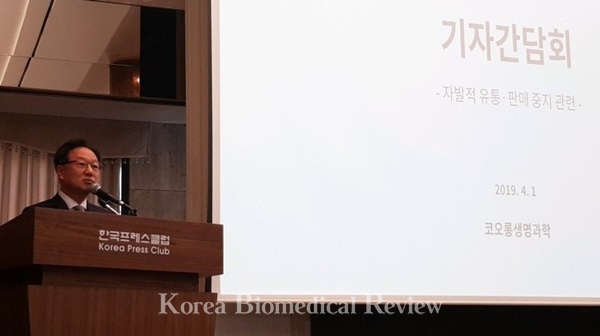Top-10 pharmaceutical news in 2019 ②

Kolon Life Science's osteoarthritis treatment, Invossa, which was once considered a promising candidate as a global new drug, disgraced itself by being thrown out of the market two years after its approval.
The core of the problem regarding the Invossa fiasco was that its “ingredients were different from those specified at the time of permission.” In March, it was revealed that the transgenic cells (TC), which was initially reported as cartilage-derived cells, were kidney-derived cells (GP2-293).
The Ministry of Food and Drug Safety demanded the submission of all data and the reason behind the sudden change of TC cells from cartilage-derived cells to GP2-293 cells. The ministry decided to revoke the permit in May after conducting self-inspection, on-site inspection, and additional on-site inspection in the U.S.
Kolon Life Science's elucidation that GP2-293 cells were "inadvertently" incorporated and that they demonstrated safety and efficacy through clinical trials with the substance failed to convince the authorities.
Kolon Life Sciences has filed an administrative suit against the ministry, claiming that the revocation of the Invossa approval was unjustified.
In the lawsuit, Kolon Life Sciences continued to claim that they did not know about the change in the TC cells until February of this year. As they used the same transformed cells from development to clinical trials and sales approval, there was no safety problem with the drug.
The ministry, on the other hand, said that GP2-293 and retroviruses have different cell sizes and that GP2-293 should have been filtered out, and even if there was a mistake, they should have conducted additional tests, based on the assumption that the cells could have changed.
Also, a ministry paper submitted to the court showed a research note drafted in 2004 by Kolon Tissuegene, Kolon Life Science’s subsidiary, which states that the company detected the GP2-293.
The regulator raised other suspicions, such as that the company might have intentionally omitted data during the approval process. The suspicion is based on the fact that Tissuegene received test results from a contract manufacturing organization stating that the second fluid contained GP2-293 in March of 2017. Also, Kolon Life Science did not submit research data on a PCR test, which showed a unique gene (gag.pol), which is only detected in GP2-293 cells.
Prosecutors are also investigating the case. So far, three executives have been detained, including the director of Kolon Life Science, the head of the clinical development team, and the chief financial officer of Kolon Tissuegene. Additionally, the court issued an arrest warrant for Kolon Life Science CEO Lee Woo-suk on charges of deceptive obstruction of justice, pharmacist law violations, and fraud.
The stock market operators suspended their decision concerning the delisting of Kolon Tissuegene.
Kolon Tissuegene, which led the development of Invossa, was listed on the Kosdaq market in 2017 thanks to the approval of Invossa from the ministry. After the Invossa incident, however, the stock price plunged, and the company faces both civil and criminal lawsuits, which drove the company into a crisis of delisting from the stock market.
However, the company managed to avoid delisting in October, as it was given a 12-month probationary period for improvement.
Accordingly, Kolon Tissuegene has to submit a statement of implementation of the improvement plan and an expert confirmation of the results of the plan within seven business days from Oct. 11, 2020.

